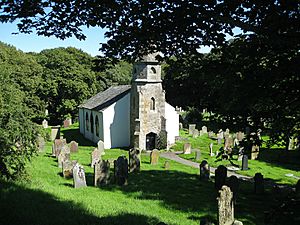St Peter's Church, Camerton facts for kids
Quick facts for kids St Peter's Church, Camerton |
|
|---|---|

St Peter's church seen from the northwest
|
|
| Lua error in Module:Location_map at line 420: attempt to index field 'wikibase' (a nil value). | |
| OS grid reference | NY 035300 |
| Location | Camerton, Cumbria |
| Country | England |
| Denomination | Church of England |
| History | |
| Status | Parish church |
| Dedication | Saint Peter |
| Architecture | |
| Functional status | Active |
| Heritage designation | Grade II |
| Designated | 13 December 1985 |
| Architectural type | Church |
| Completed | 1694 |
| Specifications | |
| Number of spires | 1 |
| Administration | |
| Parish | Seaton and Camerton |
| Deanery | Solway |
| Archdeaconry | West Cumberland |
| Diocese | Carlisle |
| Province | York |
St Peter's Church, Camerton is a historic church located in Camerton, Cumbria, England. It is a Church of England parish church, meaning it serves the local community for religious services and events. You can find it about half a mile (800 meters) south of the main village.
A Look at St Peter's Church
St Peter's Church sits in a special spot right next to the River Derwent. The river curves around it on three sides: east, north, and south. Farmland stretches out to the west. To get to the church, you travel along a road that goes through these fields.
A Long History
St Peter's Church has been a part of the Camerton community for a very long time, serving its local area since around the 11th century. This makes it one of the oldest parishes in the Diocese of Carlisle. A "parish" is like a local church district, and a "diocese" is a larger area managed by a bishop.
The church building you see today has been rebuilt at least twice. The first major rebuild happened in 1694, and then again in 1796. Later, in 1855, a new west tower and a tall, pointed spire were added. These parts were built in a style called Gothic Revival, which means they looked back to the grand, detailed designs of medieval Gothic churches.
Inside the church, there is a special stone carving called an "effigy" of Sir Thomas Curwen. He was known as "Black Tom" and his effigy dates back to 1510. An effigy is a statue of a person, often found on their tomb.
Restorations and Floods
The church has been carefully repaired and updated over the years. It was restored in 1885 and again in 1892. For a long time, the churchyard (the area around the church where people are buried) at Camerton was used for burials not just from Camerton and Seaton, but also from nearby Workington and Flimby.
St Peter's is recognized as a Grade II listed building. This means it's an important historic building that needs to be protected.
In 2009, the area experienced severe floods. Because of this, St Peter's Church had to close for 19 months while repairs were made. It reopened after the necessary work was completed.
See also
- Listed buildings in Camerton, Cumbria
 | Charles R. Drew |
 | Benjamin Banneker |
 | Jane C. Wright |
 | Roger Arliner Young |

